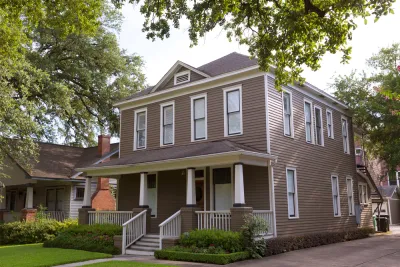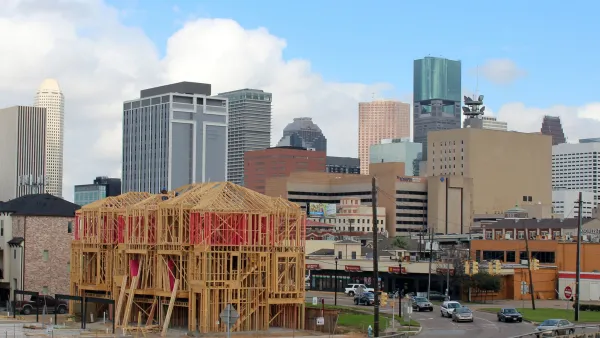In a victory for preservationists, the Texas Supreme Court upheld Houston's Historic Preservation Ordinance despite a lawsuit alleging that the ordinance constitutes illegal zoning rules.

Sara Bronin examines the long-held maxim that Houston, Texas is "zoning’s last frontier," a sprawling metropolis of essentially unregulated land uses, after a consequential ruling by the state's Supreme Court in a lawsuit that challenged Houston's Historic Preservation Ordinance as a form of de facto land use control, equivalent to zoning.
In a lawsuit named Powell v. City of Houston, two homeowners assert that the city's Historic Preservation Ordinance (HPO), “which requires covered property owners to submit plans for significant exterior changes to the city’s Archaeological and Historical Commission," constitutes a violation of "both Houston’s charter (which requires a citywide referendum to green-light zoning) and the state’s zoning enabling act (Chapter 211 of the Texas Local Government Code)."
According to the city, the HPO is not a zoning regulation. In arguing in support of the city's position, Bronin writes that "[z]oning and historic preservation law derive from distinct legal schemes and have different purposes." Unlike zoning, which regulates "uses, structures, and lots in distinctly-regulated districts," historic preservation is much less comprehensive than zoning and "largely protects a subset of built resources – historic resources – and usually applies to just a fraction of land within any particular jurisdiction."
The Texas Supreme Court agreed, ruling in June that "the ordinance does not implement zoning as that concept is originally understood, and therefore the City Charter’s limits on zoning do not apply," as the HPO "did not come close to citywide applicability, it did not subject regulated property to uniform standards, and it did not implicate uses."
The Court's decision "was a definitive victory for historic preservation, for the City, and for all Houston property owners who opted in to the HPO," letting "the city of no zoning" regulate land use in, at least, a piecemeal way.
FULL STORY: Houston: Still Zoning’s Last Frontier?

National Parks Layoffs Will Cause Communities to Lose Billions
Thousands of essential park workers were laid off this week, just before the busy spring break season.

Retro-silient?: America’s First “Eco-burb,” The Woodlands Turns 50
A master-planned community north of Houston offers lessons on green infrastructure and resilient design, but falls short of its founder’s lofty affordability and walkability goals.

Delivering for America Plan Will Downgrade Mail Service in at Least 49.5 Percent of Zip Codes
Republican and Democrat lawmakers criticize the plan for its disproportionate negative impact on rural communities.

Test News Post 1
This is a summary

Test News Headline 46
Test for the image on the front page.

Balancing Bombs and Butterflies: How the National Guard Protects a Rare Species
The National Guard at Fort Indiantown Gap uses GIS technology and land management strategies to balance military training with conservation efforts, ensuring the survival of the rare eastern regal fritillary butterfly.
Urban Design for Planners 1: Software Tools
This six-course series explores essential urban design concepts using open source software and equips planners with the tools they need to participate fully in the urban design process.
Planning for Universal Design
Learn the tools for implementing Universal Design in planning regulations.
EMC Planning Group, Inc.
Planetizen
Planetizen
Mpact (formerly Rail~Volution)
Great Falls Development Authority, Inc.
HUDs Office of Policy Development and Research
NYU Wagner Graduate School of Public Service




























